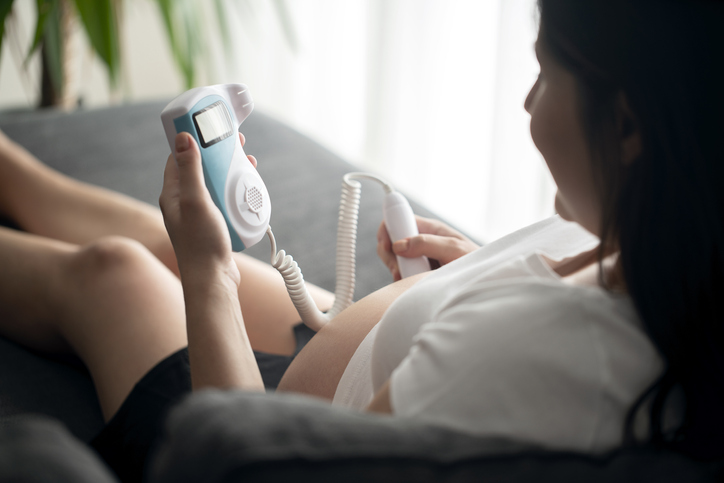When Can You Hear A Baby’s Heartbeat? Guide to Fetal Heart Rate Monitoring

Have you ever wondered how early you can hear a fetal heartbeat? Are you considering buying an at-home fetal Doppler?
Why and when might your doctor check your baby’s heartbeat? What is fetal heart rate monitoring, anyway?
All of these questions answered and more in this Ultimate Guide to Fetal Heart Rate Monitoring.
What is Fetal Heart Rate Monitoring?
You might hear these two terms used interchangeably, but they’re not the same.
Your OB-GYN may listen to your baby’s heartbeat at prenatal appointments, and you might listen to your baby’s heartbeat at home. These are single occurrences that may be used over time to establish a pattern.
Fetal heart rate monitoring, on the other hand, refers to an ongoing process. Your doctor may continuously monitor your baby’s heart rate during labor and delivery, for example (ACOG, 2023).
At How Many Weeks of Pregnancy Can You Hear a Baby’s Heartbeat?
It’s exciting to connect with your baby, and no one would blame you for wanting to check your baby’s vitals the minute you get that positive pregnancy test. However, you may have to wait a bit to hear the heartbeat.
There are different ways to listen to the fetal heartbeat. In early pregnancy, an ultrasound can detect a baby’s heartbeat. Later in your pregnancy, you can listen to your baby’s heartbeat at home, with a stethoscope, fetoscope, or Doppler device.
When Can Ultrasound Detect a Baby’s Heartbeat?

Doctors can detect a baby’s heartbeat as early as five and a half to six weeks of gestation using a transvaginal ultrasound (Chertoff, 2018).
Your doctor may not schedule that first ultrasound in early pregnancy, however, unless you have a medical condition that may affect your pregnancy, or have had a miscarriage.
Often the first ultrasound, which can be vaginal or abdominal, is scheduled for seven and a half to eight weeks of pregnancy. Other practitioners may wait until 11 to 14 weeks, as the baby’s position can affect the accuracy of the reading (Fields, 2023).
Can You Hear a Baby’s Heartbeat with a Stethoscope?
A stethoscope is a simple instrument that amplifies small sounds. They’re generally inexpensive and can be easily found in drug stores or online. Toward the middle of the second trimester, at 18 to 20 weeks, you can use a stethoscope to listen to your baby’s cardiac activity (Higuera, 2020).
Similar to the stethoscope is a Pinard horn, or fetoscope. A Pinard horn is a handheld listening device often made from wood, plastic, or aluminum. It’s shaped like a tube with a small flare on one end and a larger flare on the other. Despite its simplicity, it’s quite a sensitive instrument.
Listening to the baby’s heartbeat with one of these simple devices can be a wonderful way for both expectant parents, as well as older siblings-to-be, to bond with the new baby.
Can You Hear a Baby’s Heartbeat by Ear?
Some moms report that they can hear their baby’s heartbeat unassisted if it’s quiet enough. However, for most people, this is difficult or impossible (Chertoff, 2018).
Do Apps Work to Hear a Baby’s Heartbeat?
The short answer is no.
Some smartphone apps claim to detect a fetal heartbeat. However, a study of 22 fetal heart rate monitoring apps found that none of the apps provided accurate readings (Soffer & Chen, 2019).
What is a Fetal Doppler?
A Doppler device is a type of ultrasound that measures blood flow by bouncing high-frequency sound waves off of circulating red blood cells. A Doppler ultrasound is slightly different from a regular ultrasound, as a regular ultrasound produces images but can’t show blood flow (Sheps).

A fetal doppler, also called a fetal echocardiogram, uses a handheld device on the outside of the body to look at a baby inside the womb. It’s painless and non-invasive.
A handheld Doppler may be used to look at blood circulation, especially blood flow to and from the heart chambers. It can also be used to examine the blood flow in the umbilical cord and placenta.
This, in turn, can help doctors to detect problems and abnormalities at different stages of pregnancy.
Is it Safe to Use a Fetal Doppler At Home?
Recently, a variety of at-home fetal Doppler devices have come on the market. Some expectant parents use them to keep an eye on their baby’s heart rate, but a more common use is to take “keepsake” photos.
Although no safety issues have been reported, the FDA warns against using a home Doppler for several reasons (FDA, 2014).
First, a Doppler device is technically prescription medical equipment that requires training for safe and accurate use. It should only be used by a medical professional.
Also, ultrasound devices can heat fetal tissue slightly and can produce small bubbles in tissues. Occasional medical use shouldn’t cause problems, but the danger increases when home users reach for the Doppler every day to monitor their babies.
According to the FDA, a Doppler should only be used when medically necessary.
A home Doppler can be a cause of anxiety for the expectant parent if the reading isn’t what the parent thinks it should be. Anxiety and stress themselves can harm the brain of a developing baby, not to mention the health of the expectant parent (Valenti, 2022).
Conversely, a Doppler reading can provide a false sense of security. Parents may, for example, notice their baby is moving less, but fail to seek medical treatment because their home Doppler shows a fetal heartbeat.
Importance of Fetal Heart Rate Monitoring During Pregnancy
Over the course of your pregnancy, your doctor will listen to your baby’s heart rate.
The fetal heartbeat is an important indicator of health and fetal development. Specifically, if your baby’s heart rate is too fast, too slow, or changes too much, it could indicate a problem.
As your due date approaches, your doctor may monitor your baby’s heart rate more closely, especially if you have a medical condition that may affect your pregnancy, if you’ve had a previous miscarriage, or if you have had trouble bringing a baby to term.
How Fast Should Baby’s Heartbeat Be?
Your baby’s heart will begin to beat at around five weeks gestation.
Your baby’s heart rate will increase by some three beats per minute every day during the first month (Valenti et ali, 2011). This is one of the ways that your healthcare practitioner can determine your baby’s gestational age.
At nine weeks gestation, the fetal heart rate should be around 170 beats per minute.
After the 13th week of pregnancy, the baby’s heart rate will begin to slow. The normal fetal heart rate at mid-pregnancy should be between 110 and 160 beats per minute.
A baby’s heart rate will slow even more during the final 10 weeks of pregnancy.
A Guide to average fetal heart rates by week:
- 5 weeks pregnant: 110 beats per minute
- 9 weeks pregnant: 170 beats per minute
- 20 to 24 weeks pregnant: 144 beats per minute
- 28 to 32 weeks pregnant: 140 beats per minute
- 34 to 38 weeks pregnant: 136 beats per minute
What Can an Abnormal Fetal Heart Rate Indicate?
If your baby’s heart rate is too fast, too slow, or changes too much, it may indicate a congenital heart defect or fetal distress.
What if You Don’t Hear Your Baby’s Heartbeat?
First, don’t panic. There are numerous different reasons you might not be hearing your baby’s heartbeat.
It may be too early in your pregnancy to hear the heartbeat, for example. Remember that the first time you’ll be able to pick up the sound with a stethoscope will be between 18 and 20 weeks of pregnancy.
Also, your baby may not be in the best position for its heartbeat to be heard. If your baby is small, or you have a tipped uterus, you might not hear that heartbeat, even if it’s strong.
If you’re overweight or have a large abdomen, you might also have trouble hearing the heartbeat.
Finally, home equipment may not be completely accurate.
That said, if you have any concerns, it’s important to contact your healthcare provider immediately. That’s what they’re there for!

